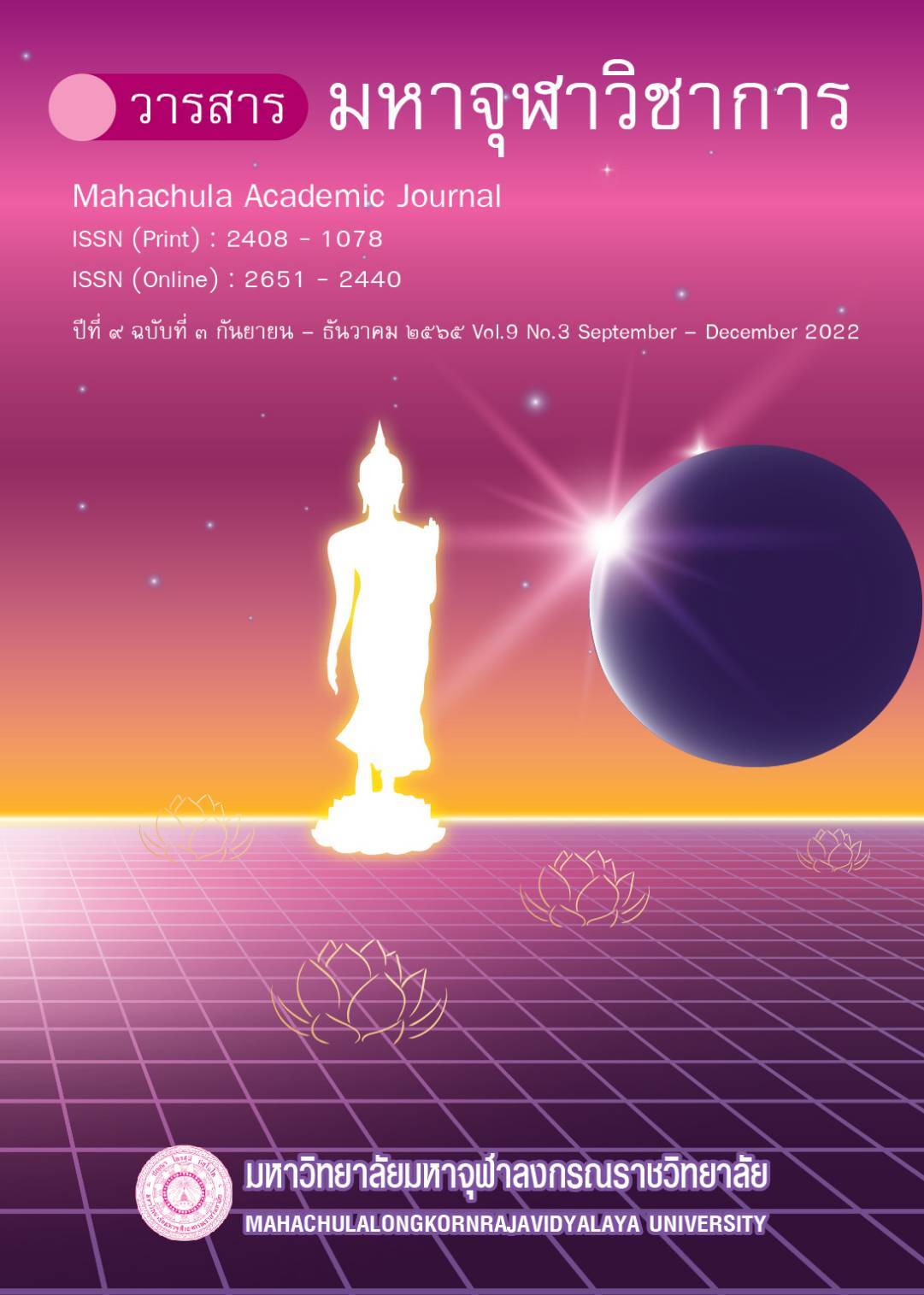Leadership and Conflict Resolution in the Organization by Buddhist Peaceful Principles
Main Article Content
Abstract
Conflict is defined as a situation or scenario in which two or more people behave or expose their behavior in different ways. Conflicts emerge as a result of differing perspectives of different goals, including misconceptions or a failure to comprehend the objectives. Conflict inside an organization is caused not only by differing viewpoints, but also by differences in dignity, statues, positions, duties, roles, and values; as a result, the methods for resolving conflicts must be diverse. The findings from this study show five conflict management styles: (1) Avoidance;(2) Accommodation; (3) Competition; (4) Compromise; and (5) Collaboration. According to Buddhism, there are two approaches to conflict resolution which are: (1) inner conflict; and (2) external conflict. The Dhamma that can manage and resolve conflict, allowing humans to become more whole, integrated with modern sciences, which can be divided into four categories as follows: (1) Life fundamentals; (2) Life quality development; (3) Responding to community, society, and nation; and (4) Helping, healing, and resolving the global crisis. The Buddhist principles can correlate to nature and its reality, which contributes to the mobilization of conflict resolution efforts, and transform conflict into motivation and incentive among differences, resulting in the work efficiency and benefits for the organization.
Article Details

This work is licensed under a Creative Commons Attribution-NonCommercial-NoDerivatives 4.0 International License.
References
ขจรจิต บุนนาค. “ความขัดแย้ง VS ความรุนแรง”. วารสารนักบริหาร. ปีที่ ๓๑ ฉบับที่ ๓ (๒๕๕๔): ๑๓๖-๑๔๔.
จุมพล พูลภัทรชีวิน. การวิจัยและพัฒนากระบวนการสร้างความดีมีคุณธรรม. กรุงเทพมหานคร : ศูนย์ส่งเสริมและพัฒนาพลังแผ่นดินเชิงคุณธรรม (ศูนย์คุณธรรม), ๒๕๔๙.
นฤมล เพ็ญสิริวรรณ. “ภาวะผู้นํากับการพัฒนาองค์กรให้มีประสิทธิภาพสูงสุด”. วารสาร มจร มนุษยศาสตร์ปริทรรศน์. ปีที่ ๔ ฉบับที่ ๒ (กรกฎาคม-ธันวาคม ๑๕๖๑): ๑๑๘.
ประพันธ์ ช่วงภูศรีและสำเริง บูรณะสิงห์. การบริหารความขัดแย้งและบริหารภาวะวิฤกต. กรุงเทพมหานคร: สถาบันดำรงราชานุภาพ สำนักงานปลัดกระทรวงมหาดไทย, ๒๕๕๔.
พรกิจ กิจจารุวัฒนากูล. “การประยุกต์ใช้หลักธรรมเพื่อแก้ปัญหาครอบครัวในสังคมปัจจุบัน”. วิทยานิพนธ์พุทธศาสตรมหาบัณฑิต. บัณฑิตวิทยาลัย : มหาวิทยาลัยมหาจุฬาลงกรณราชวิทยาลัย, ๒๕๕๑.
พระครูโสภณวีรานุวัตร พระครูอุดมธรรมจารี พระครูศรีอรรถศาสก์ และธนัชพร เกตุคง. “พุทธวิธีการบริหารความขัดแย้ง”. วารสาร มจร หริภุญชัยปริทรรศน์. ปีที่ ๓ ฉบับที่ ๒ (กรกฎาคม – ธันวาคม ๒๕๖๒) : ๘๐.
พระเทพวัชรบัณฑิต. พุทธวิธีแก้ปัญหาความขัดแย้ง. [ออนไลน์]. แหล่งที่มา: https://shorturl.asia/3w7ql. [๑๓ มีนาคม ๒๕๖๕].
พระธรรมปิฎก (ป. อ. ปยุตฺโต). สลายความขัดแย้ง. กรุงเทพมหานคร : โรงพิมพ์สหธรรมิก, ๒๕๔๖.
พระธรรมปิฎก (ป. อ. ปยุตฺโต). พจนานุกรมพุทธศาสน์ ฉบับประมวลศัพท์. พิมพ์ครั้งที่ ๑๑. กรุงเทพมหานคร : มหาวิทยาลัยมหาจุฬาลงกรณราชวิทยาลัย, ๒๕๔๖.
มหาวิทยาลัยมหาจุฬาลงกรณราชวิทยาลัย. พระไตรปิฎกภาษาไทย ฉบับมหาจุฬาลงกรณราชวิทยาลัย. กรุงเทพมหานคร : โรงพิมพ์มหาจุฬาลงกรณราชวิทยาลัย, ๒๕๓๙.
วิลเลี่ยม ไฮเน็คกี้ และ โจนาธาน มาร์ซ จีระ หงส์ลดารมภ์ และบุญรัตน์ อภิชาตไตรสรณ์ (แปล). เถ้าแก่มือโปร. พิมพ์ครั้งที่ ๒. กรุงเทพมหานคร : ไดเร็คมีเดียกรุ๊ป, ๒๕๕๘.
วิศิษฏ์ เจนนานนท์. “การใช้หลักพุทธธรรมในกระบวนการเจรจาไกล่เกลี่ยความขัดแย้งในชุมชนของผู้ใหญ่บ้านและคณะกรรมการหมู่บ้าน ศึกษากรณี บ้านเขวากลาง หมู่ ๒ ตำบลเขวาใหญ่อำเภอกันทรวิชัย จังหวัดมหาสารคาม”. วารสารการเมืองการปกครอง. ปีที่ ๑๐ ฉบับที่ ๒ (พฤษภาคม – สิงหาคม ๒๕๖๓) : ๑๒๙.
ศิริวรรณ มนอัตระผดุง. “การจัดการความขัดแย้งในองค์การอย่างสร้างสรรค”. วารสารวไลยอลงกรณ์ปริทัศน์. ปีที่ ๖ ฉบับที่ ๒ (๒๕๕๙): ๑๑.
สมพล วงศ์วิวัฒน์. “รูปแบบภาวะผู้นำและความพึงพอใจของพนักงานต่อรูปแบบภาวะผู้นำของหัวหน้าสำนักงานกองทุนสงเคราะห์การทำสวนยาง”. ภาคนิพนธ์พัฒนบริหารศาสตรมหาบัณฑิต. คณะพัฒนาสังคม : สถาบันบัณฑิตพัฒนาบริหารศาสตร์, ๒๕๔๑.
Frigon, N. L., & Jackson. H. K., The leader: Developing the skills & personal qualities you need to lead effectively. New York: AMACOM, 1996.
Gibson, James L. Ivancevich. John M. and Donnelly, James H. Jr. Organizations, Behavior Structure Processes, International Edition. United States of America: Irwin/McGraw-Hill,1997.
Nelson, D. L. & Quick. J. C. Organization. Behavior. 2nd ed. New York: Harper and Row,1997.
Stephen R. Covey. The 7 habits of highly effective people: powerful lessons in personal change. 15th anniversary edition. London : Pocket Books, 2004.


